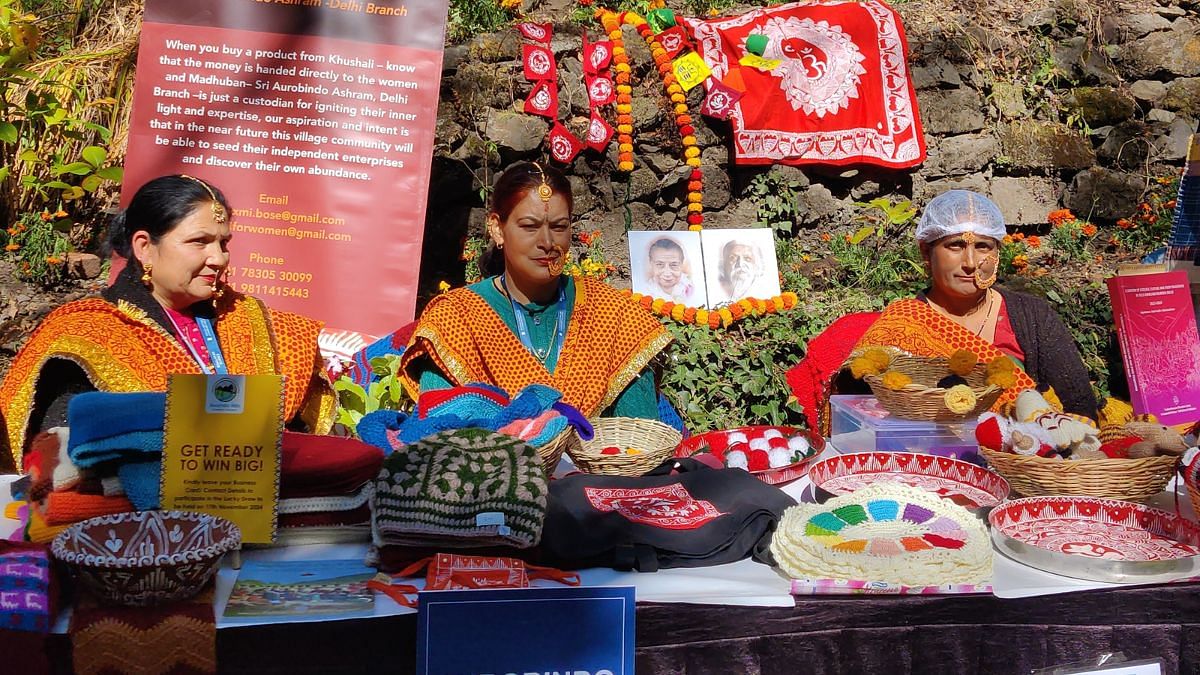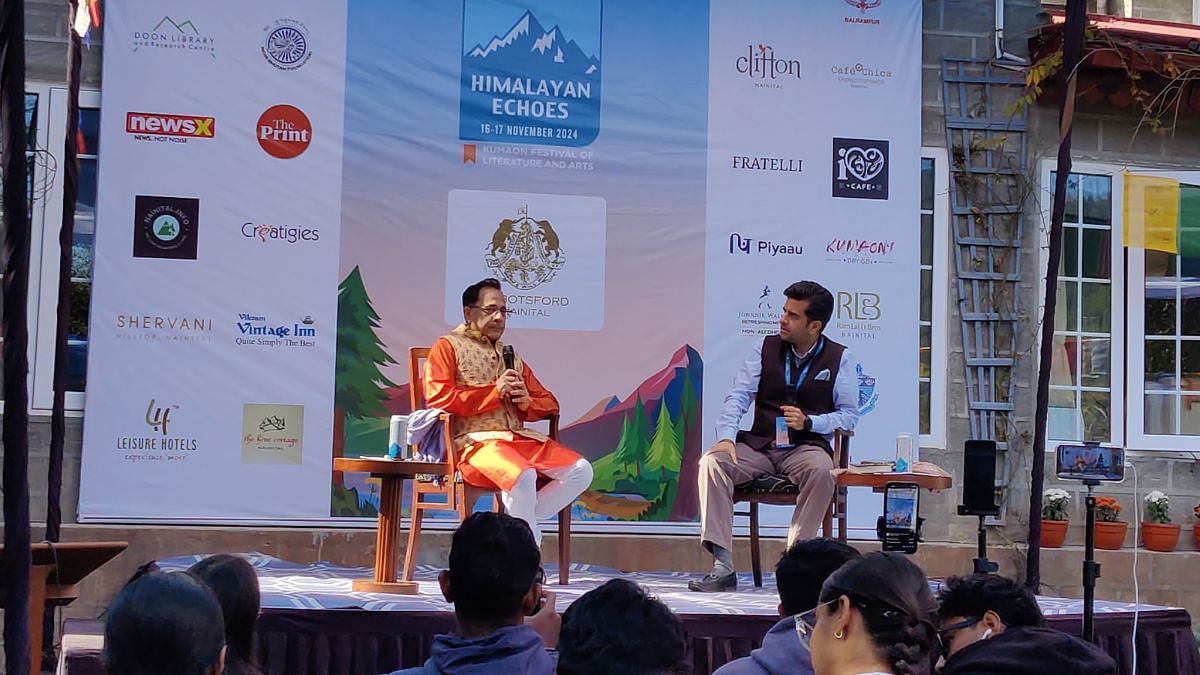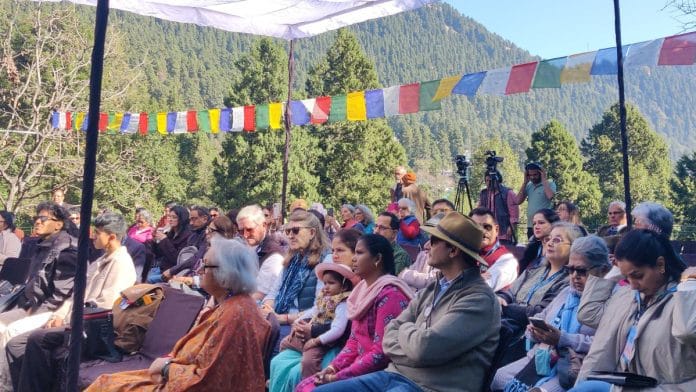Nainital: As noted historian, environmentalist and Padma Shri awardee Shekhar Pathak laid down the premise of a discussion in the presence of several fellow authors, naturalists, publishers and readers in Uttarakhand’s Nainital Saturday, he asserted that the Himalayas are suffering from “unclear” ideas about development. Roads, dams and destruction are often termed as development, he said.
“There are 15 roads leading to the same place, with bulldozers running everywhere. I call it ‘bulldozer terrorism’,” Nepalese writer Sujeev Shakya chimed in. Together, the two highlighted what was to constitute the major chunk of conversations over the next two days.
At the 2024 edition of Himalayan Echoes—Kumaon Festival of Literature and Arts, the Himalayas emerged as the hero that needs saving.
Several voices agreed that the mountain system, home to a rich biodiversity and multiple ethnicities, needs preservation and protection—both ecologically and culturally—and that the right way to do so is by ensuring the passage of knowledge and traditions across generations.
The literary festival, which first came into shape 9 years ago, was focused on celebrating the Himalayan heritage, Kumaoni culture, and, of course, the art of writing and storytelling. This year, the festival hosted about 20 speakers.
The discourse around the preservation of the Himalayas is not new. Climate change, depleting forest cover on account of commercial activities, rampant forest fires, devastating landslides and floods have affected several parts of the range year after year. Uttarakhand alone has witnessed a drop of 20.7 kilo hectares of tree cover between 2001 and 2023—a 1.1 percent decline since 2000, according to the Global Forest Watch project.
“I have been travelling across the Himalayas for 50 years now. The tranquility in the Himalayas back then was supreme. You could almost hear even a leaf fall off a tree and the birds chirp. Now, the noise and the encroachment has spread to the innermost areas. There should be certain areas that one should just walk to, untouched by cars or helicopters. Because it disturbs the entire ecosystem there,” Pathak told ThePrint on the sidelines of the event. “Development for the purpose of defence or access to villages is understandable, but why does it have to encroach upon the wilderness?”

Slamming the role of the ruling establishment, he said, “Our government has been the most irresponsible. The way they have dug up the mountains… There should be restrictions on vehicle movement, throwing garbage. All the bad elements of tourism have, in fact, been introduced into the tradition of pilgrimage, especially in Uttarakhand.”
Botanist S. Natesh, meanwhile, made a case for appreciating India’s “tree wealth”. Speaking about his book Iconic Trees of India, which documents the most remarkable trees across the country, one of which is over 2,000 years old, he said, “This book, because of page constraints, has listed only 75 trees. There are so many out there, waiting to be discovered. From awareness will come appreciation, and appreciation will lead to ownership of the trees. That leads to protection…. Enjoy, celebrate, be aware and appreciate, and then pass this on to the next generation.”
Naturalist, trekker and guide Jennifer Nandi, whose book No Half Measures recounts her travels across the Northeast, remarked: “Why the Northeast? I found it to be staggeringly beautiful. The Brahmaputra is such a mighty river. It’s more like a sea. It harbours this river island called Majuli, the largest river island in the world. Namdapha (national park) is home to four felines—one tiger and three types of leopards. Where do you get all this in one place?”
Also read: The world’s most famous headstand in 1951 was by a teacher on the snow-capped Himalayas
Preserving Himalayan culinary traditions
In the cultural sense, a key element of Himalayan heritage that warrants “intergenerational knowledge transfer” is food traditions.
It is important to document the traditional recipes before they die a natural death, said Rohini Rana, who has authored two cookbooks on Nepal’s culinary palate.
“Some of them are so time-intensive, so labour intensive that no one in today’s fast world…the culture of fast food…has the time or the energy to make them. So, I said let me at least document it in case one young child says, ‘Oh! I’m gonna try this’.”

Academic and communications specialist Vijayluxmi Bose echoed the sentiment in a different interaction. “You know what’s happening to Uttarakhand… how many Maggi points do you see on your drive down the road?”
She said, “There are certain foods that are only cooked during festivals, which are deeply connected to nature.” They should be cooked more often, she argued.
‘Fiction thrives on conflict’
Himalayan Echoes saw authors and publishers from different genres come together to also discuss the intricacies of creating bestsellers.
For instance, where does Vikas Swarup—author of Q & A, which was adapted into the Oscar-winning Slumdog Millionaire—draw inspiration from for his thriller novels? “Everyday life in India, just reading one day’s newspaper can give you plots for four-five different novels,” he said.
According to Swarup, a retired Indian Foreign Service officer, creativity is “inherent in diplomacy”.
“All diplomats are creative. A diplomat is someone who can tell you to go to hell in such a way that you actually look forward to the trip,” he remarked. “In diplomacy, you are exposed to actual conflict. Like when I was posted in Ethiopia, the Ethiopia-Eritrea war was happening. In my first posting in Turkey, I was sent to rescue Indians fleeing the first Gulf war. Fiction is about internal conflict. Without conflict, there is no resolution… All fiction thrives on conflict. Books with no conflict are surface reads. When there is conflict, the reader is curious.”
Much was also discussed about the influx of technology in the sphere of writing. “We should not be thinking of audio books, e-books, books that are published straight on to a phone app as non-books. They are books. They are stories. As publishers, we have to make sure that we are available on platforms where our readers want to read our authors,” said Priya Kapoor, editorial director at publishing house Roli Books.
To several members in the audience, however, a ‘book’ had varied definitions. “The fun of turning that page across when you read a book… the feel and smell of a book… to me, that is the most important,” one of them said.
As another audience member, a young school student, broached the subject of artificial intelligence (AI), writer-publisher Namita Gokhale said that one of the key complaints or fears among writers with respect to AI is that their individual creativity or copyright will be intruded on.
“Every time the Mahabharata or Ramayana or folk tales were retold, the way who told them added to them. They are part of the larger community consciousness. AI, in the future, can gather all the information and tell its own stories. I don’t think it will happen in a hurry. But the way the world is changing, it could happen. I am not afraid of technology,” she said. “There are some bits of creativity that still we humans do well. But if we are aided and abetted by technology, we’ll do it even better.”

Senior lawyer and author Saurabh Kirpal was also in attendance at the festival and addressed issues like same-sex marriage, reservation and the obstacle to his appointment as a judge. Kirpal’s name was first recommended for judgeship in 2017 by the Delhi High Court Collegium, which was approved by Supreme Court Collegium in 2021 and reiterated in 2023.
“There’s no denying the fact that my appointment has been held up because of my sexuality. Why that should make a difference to anybody, I fail to understand. But obviously, it does matter to people, and because it matters to them and it matters to me, I find that you have to resist even more,” he said. “You can bring change by being maybe seen as a reasonable person, who’s putting out things in the public domain, which need to be said, in a spill of dialogue and conversation.”
ThePrint is the digital media partner for the Himalayan Echoes—Kumaon Festival of Literature and Arts
Also read: ‘Indians willing to bargain lives for cheap treks’—trekking companies have no govt oversight






